With all the benefits heat recovery systems have to offer, it’s still surprising how many people aren’t aware of their many advantages. Heat recovery systems can instantly improve the quality of your home’s ventilation, air, and energy efficiency, and they are rather inexpensive when considering how beneficial they can be. In this article, we’re going to address some of the most common questions people may have about heat recovery ventilation systems.
Do I Absolutely Need a Heat Recovery Ventilation System?
While you can still live with stagnant air and no ventilation, it’s not always ideal, especially if you have to deal with respiratory issues and like clean air. A heat recovery system will instantly improve the quality of the air in your house and reduce the number of allergens. It will also allow you to reduce dampness in your house, which will be beneficial for your own personal comfort and to improve the house’s durability. Not only that, but it will allow you to get ventilation without putting too much strain on your cooling and heating systems.
How Do I Perform Maintenance on My Ventilation System?
Like any forced-air system, the most important component to keep an eye on is the air filter. The way you deal with the filter will depend on the unit. In some cases, you’ll have to completely replace the filter, and in others, all you’ll have to do is clean it up. If your unit has a reusable filter, then you should be careful to not put it back until it’s completely dry.
But whatever the unit, you’ll usually have to clean or replace the filter every 1 to 3 months. You should also clean the condensate drain, energy recovery core, and the outside screens and hoods. If you need replacement parts, you could visit a site like https://www.bpcventilation.com/ and get them at a discount instead of going with a smaller retailer or contractor.
How Do I Know How Powerful a System is?
Before you pick a unit, you have to make sure that it will be powerful enough for your needs. There are two ways that you can tell how powerful a unit is. The air flow capacity of a unit is calculated in CFM, or cubic feet per min. This will tell you exactly how much ventilation your unit will be able to give you. You will also have to check the energy recovery efficiency percentage to see the exact amount of heat the unit will recover and redirect out of your house. Other things you should be looking for before buying a unit are the warranty and how much noise it will generate.
As you can see, heat recovery ventilation systems have plenty of things going for them and are a great choice if you’re trying to improve air quality while reducing your energy costs. Contact a professional today if you need more information about heat recovery systems and heat recovery technology in general.
